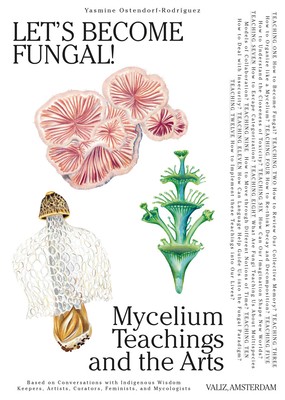
- We will send in 10–14 business days.
- Author: Yasmine Ostendorf-RodrÃÂguez
- Publisher: VALIZ
- ISBN-10: 9493246280
- ISBN-13: 9789493246287
- Format: 16.5 x 23.9 x 2.5 cm, minkšti viršeliai
- Language: English
- SAVE -10% with code: EXTRA
Reviews
Description
There is a growing interest in fungi and mycelium as a material, the ever-branching connecting threads of the fungal world. The entanglements and how this rhizomatic network functions is not just a fascinating ecological system and material, but carries a profound usefulness as a metaphor for our potential new systems, ways of thinking and behaviors.
Let’s Become Fungal! takes its inspiration from the world of art and mycology and shares innovative practices from Latin America and the Caribbean that are rooted in multispecies collaboration, symbiosis, alliances, non-monetary resource exchange, decentralization, bottom-up methods and mutual dependency—all in line with the behavior of the mycelium.
Every chapter is phrased as a question. They do not lead to answers, but to twelve teachings addressing for instance collaboration, decoloniality, non-linearity, toxicity, mobilization, biomimicry, death, and being non-binary. Simultaneously it ventures deeper into the world of fungi. The teachings from the fungus may inspire artists, collectives, organizations, educators, policy-makers, designers, scientists, anthropologists, change-makers, curators, urbanists, activists, gardeners, community-leaders, farmers, and many others, to become more fungal in their ways of working and being.
Yasmine Ostendorf-Rodríguez works as a curator and researcher on art and ecology, and is based in Mexico City. She has founded and directed many international initiatives at the intersection of art and ecology, including the Green Art Lab Alliance (Asia, Latin America and Europe) and the Nature Research Department, the Van Eyck Food Lab, and the Future Materials Bank at the Jan van Eyck Academie (NL).
EXTRA 10 % discount with code: EXTRA
The promotion ends in 23d.19:53:37
The discount code is valid when purchasing from 10 €. Discounts do not stack.
- Author: Yasmine Ostendorf-RodrÃÂguez
- Publisher: VALIZ
- ISBN-10: 9493246280
- ISBN-13: 9789493246287
- Format: 16.5 x 23.9 x 2.5 cm, minkšti viršeliai
- Language: English English
There is a growing interest in fungi and mycelium as a material, the ever-branching connecting threads of the fungal world. The entanglements and how this rhizomatic network functions is not just a fascinating ecological system and material, but carries a profound usefulness as a metaphor for our potential new systems, ways of thinking and behaviors.
Let’s Become Fungal! takes its inspiration from the world of art and mycology and shares innovative practices from Latin America and the Caribbean that are rooted in multispecies collaboration, symbiosis, alliances, non-monetary resource exchange, decentralization, bottom-up methods and mutual dependency—all in line with the behavior of the mycelium.
Every chapter is phrased as a question. They do not lead to answers, but to twelve teachings addressing for instance collaboration, decoloniality, non-linearity, toxicity, mobilization, biomimicry, death, and being non-binary. Simultaneously it ventures deeper into the world of fungi. The teachings from the fungus may inspire artists, collectives, organizations, educators, policy-makers, designers, scientists, anthropologists, change-makers, curators, urbanists, activists, gardeners, community-leaders, farmers, and many others, to become more fungal in their ways of working and being.
Yasmine Ostendorf-Rodríguez works as a curator and researcher on art and ecology, and is based in Mexico City. She has founded and directed many international initiatives at the intersection of art and ecology, including the Green Art Lab Alliance (Asia, Latin America and Europe) and the Nature Research Department, the Van Eyck Food Lab, and the Future Materials Bank at the Jan van Eyck Academie (NL).


Reviews